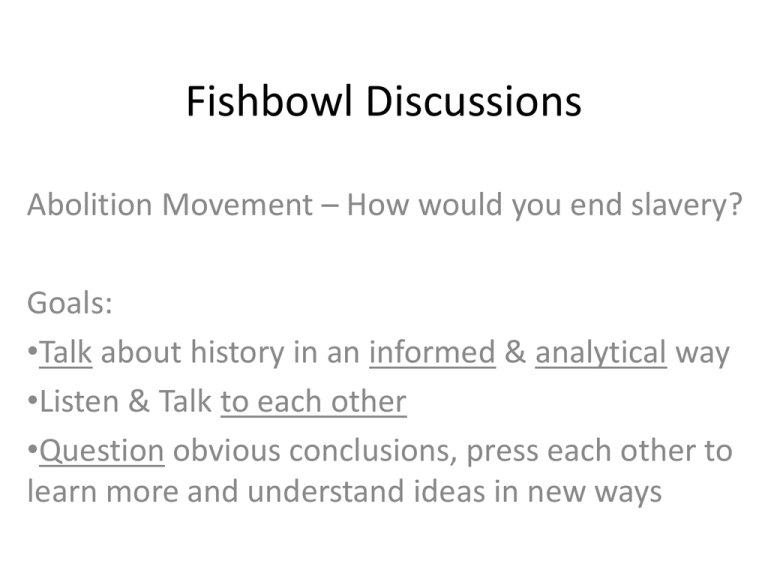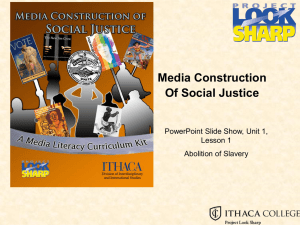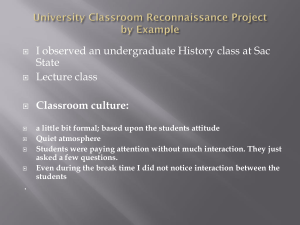Fishbowl Discussions
advertisement

Fishbowl Discussions Abolition Movement – How would you end slavery? Goals: •Talk about history in an informed & analytical way •Listen & Talk to each other •Question obvious conclusions, press each other to learn more and understand ideas in new ways American Anti-Slavery Society Questions to consider: 1. Will the AASS contribute funds for colonization and allow its name to be used in this effort? 2. Should the AASS spend time and money opposing racial discrimination in the North in addition to slavery in the South? 3. Should the AASS publicly endorse Seneca Falls and the betterment of women? 4. Should the AASS support armed attempts to stop the Fugitive Slave Act? 5. Should the AASS support John Brown with money and/or guns? Slavery’s Global Context The Case of West Africa Squadron & William Wilberforce West Af Squad & Will Wilberforce • Britain outlawed the slave trade in 1807 – West Africa Squadron was a group of British Royal Navy vessels that patrolled the African coast capturing slave ships and freeing African slaves • Britain outlawed slavery in 1833 – William Wilberforce was an evangelical Christian & member of British parliament who led call to abolish slavery in the British empire on moral grounds What does the existence of the West Africa Squadron say about 19th c. slavery in the U.S.? Views of Slavery in South Southern Slave Owning Families • 75% of Southern families owned NO slaves • Of the remaining 25%, 2/3 owned fewer than 10 slaves What does the distribution of slave ownership in the South say about 19th c. slavery in the U.S.? Southern Slavery • Planter aristocracy • Small farm slave owners • Subsistence farmers w/o slaves – Often stoutest defenders of slavery: • American dream of upward mobility • Wanted to maintain racial superiority • Mountain whites of Appalachians – Resented planter aristocracy, blacks, & problems that came with slavery – Felt greater loyalty to North American Abolition Movement Abolition • Fuelled by 2nd Great Awakening, emphasized the harshness of Southern planters – Breakers = harsh physical punishers assigned to whip & break black resistance Vs. – Slaves as a commodity and investment = most dangerous work often assigned to Irish day laborers – Likely a compromised position Often said that “The South hated the race but loved the individual, while the North loved the race but hated the individual.” Abolition • Early, gradual approaches – American Colonization Society: which advocated gradually freeing slaves, compensating planters, & sending African Americans back to colonize Africa • Richard (Bishop) Allen – Started African American ministry & convention of free black – pushed for move to Canada Abolition • Later, radical approaches – William Lloyd Garrison • Uncompromising, white reformer inspired by 2nd Great Awakening to write incendiary newspaper, The Liberator William Lloyd Garrison • Discussed slavery as moral issue rather than economic • Believed it undermined republican values Abolition • Later, radical approaches – William Lloyd Garrison • Uncompromising, white reformer inspired by 2nd Great Awakening to write incendiary newspaper, The Liberator – David Walker • Free black who called for slaves to fight to end enslavement & those who didn’t deserved to be enslaved Abolition • Later, radical approaches – William Lloyd Garrison • Uncompromising, white reformer inspired by 2nd Great Awakening to write incendiary newspaper, The Liberator – David Walker • Free black who called for slaves to end enslavement & those who didn’t deserved to be enslaved – Sojourner Truth • Free black woman who spoke of the sin of slavery & religious justification for ending oppression of African Americans & women Sojourner Truth Abolition • Later, radical approaches – William Lloyd Garrison • Uncompromising, white reformer inspired by 2nd Great Awakening to write incendiary newspaper, The Liberator – David Walker • Free black who called for slaves to end enslavement & those who didn’t deserved to be enslaved – Sojourner Truth • Free black woman who spoke of the sin of slavery & religious justification for ending oppression of African Americans & women – Frederick Douglass • Free black whose literary & lecture skills made him a popular voice of the struggles of being enslaved Frederick Douglass Fear The Case of Haiti, Nat Turner, & the Amistad Haiti, Nat Turner, & the Amistad • Haiti’s successful slave revolution & overthrow of French rule served as a warning to American planters • Nat Turner’s violent rebellion in Virginia furthered these fears as an American example • Amistad was Spanish slave ship in which slaves successfully rebelled off coast of Cuba and were driven ashore in Long Island before U.S. declared the slaves free & returned them to Africa Impact of Abolition Movement Impact of Abolition Movement • Abolition movement & supporters were wildly unpopular in both North & South, and among politicians & citizens • But, movement helped Northerners cast South as un-free and want to prevent slavery’s spread to new territory



